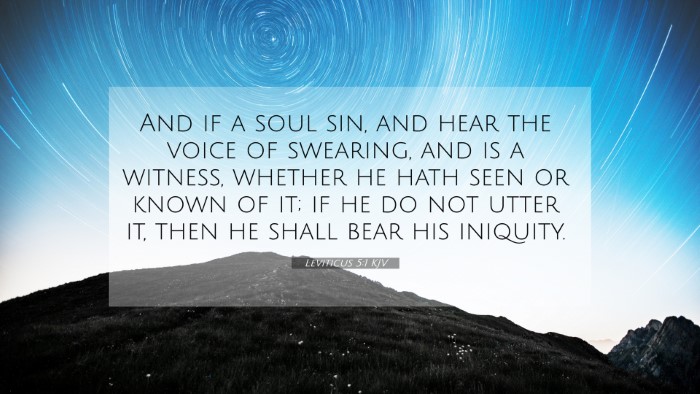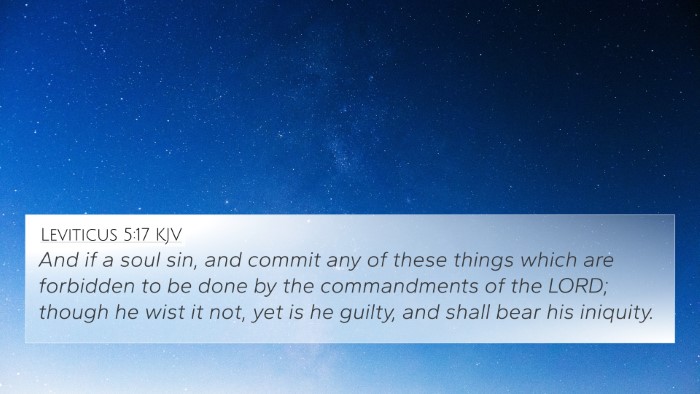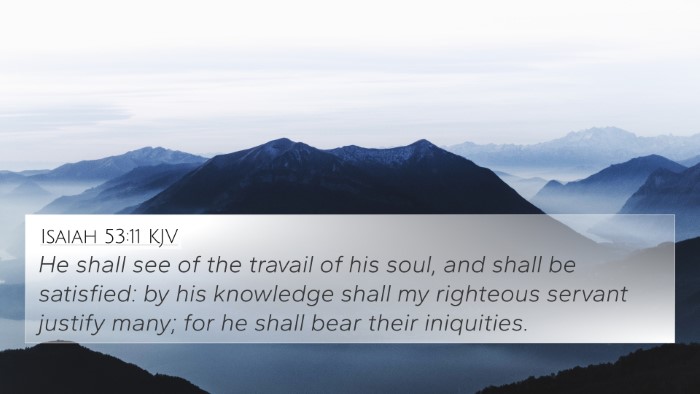Understanding Leviticus 5:1
Leviticus 5:1 presents a critical aspect of the Mosaic Law, particularly in establishing the relationship between God's holiness and human behavior. In this verse, the Lord outlines the responsibility of individuals who witness wrongdoing and the implications of failing to act. This call to accountability emphasizes moral duty and the spiritual consequences of sin. Below, we explore the insights derived from public domain commentaries, revealing deeper meanings and contextual understanding.
Verse Analysis
Leviticus 5:1 (NKJV): "If a person sins in hearing the utterance of an oath, and is a witness, whether he has seen or known of the matter, if he does not tell it, he bears guilt."
Insights from Commentaries
Matthew Henry: Henry emphasizes the seriousness of bearing testimony, noting that silence when one could speak up is a sin of omission. The verse highlights that knowing the truth obligates one to act upon it, affirming that failures in moral duties have serious consequences. He interprets this not merely as a legal obligation but as a matter of justice and fidelity to God’s commandments.
Albert Barnes: Barnes explains that being a witness in this context refers to both active and passive knowledge of a sin. He underscores the idea that if an individual hears an oath and remains silent, they are culpable for that silence. This points to a broader theme of accountability within the community, encouraging believers to uphold truth and righteousness.
Adam Clarke: Clarke adds a pastoral dimension, noting that this command was part of the ceremonial law that mirrored the moral obligations humans owe to one another. He argues that while this law may not directly apply to Christians today, the fundamental principle of witnessing to the truth and bearing responsibility for communal integrity is eternally relevant.
Thematic Connections
Leviticus 5:1 connects with numerous biblical themes around truth, justice, and personal responsibility. It helps form a crucial foundation for understanding later biblical teachings regarding sin and community ethics. Here are some thematic connections and cross-references:
- Exodus 20:16: "You shall not bear false witness against your neighbor."
- Numbers 5:6-7: "Speak to the children of Israel... confess the sin." This emphasizes the importance of confession and accountability.
- Psalms 51:13: David expresses his desire to teach transgressors God's ways, highlighting the transformative power of bearing witness.
- James 5:16: "Confess your trespasses to one another, and pray for one another." This reinforces the ongoing need for confession and accountability in community.
- Matthew 18:15: Jesus outlines the process for addressing a brother's sin, reflecting the same underpinning ethics of accountability.
- Proverbs 24:11-12: Encouragement to rescue those who are being taken away for death, highlighting moral responsibility to act when others face peril.
- 1 John 1:9: The promise that if we confess our sins, He is faithful and just to forgive, linking confession with receiving forgiveness.
Implications for Today
The principles underlying Leviticus 5:1 apply to both personal righteousness and communal integrity in our modern context. Believers are called to uphold truth, serve as witnesses, and foster an environment where accountability is respected. This verse challenges individuals to reflect on their own responsibilities when they are aware of wrongdoing and consider the spiritual significance of their actions or inactions.
Cross-Referencing Bible Study
To engage effectively with Leviticus 5:1, one can utilize various tools for cross-referencing. The following methods can enhance understanding:
- Use a Bible concordance to locate key terms and concepts across scriptures, revealing a broader context.
- Employ a cross-reference Bible study guide to contextualize the verse within both Old and New Testament teachings.
- Develop a comprehensive Bible cross-reference system that includes thematic and topic-based connections.
- Engage in a detailed comparative study to discover similarities between Old Testament laws and New Testament principles.
- Leverage Bible reference resources to explore interpretations and applications of sin, justice, and community ethics.
Conclusion
Leviticus 5:1 serves as a compelling reminder of the weightiness of our words and the responsibility we bear towards each other as members of a faith community. The theme of accountability resonates throughout scripture, establishing a continuous dialogue between God’s law and the actions of believers throughout the ages. Utilizing Bible cross-references can deepen this understanding, revealing the interconnectedness of biblical themes as they relate to personal morality and community integrity.























